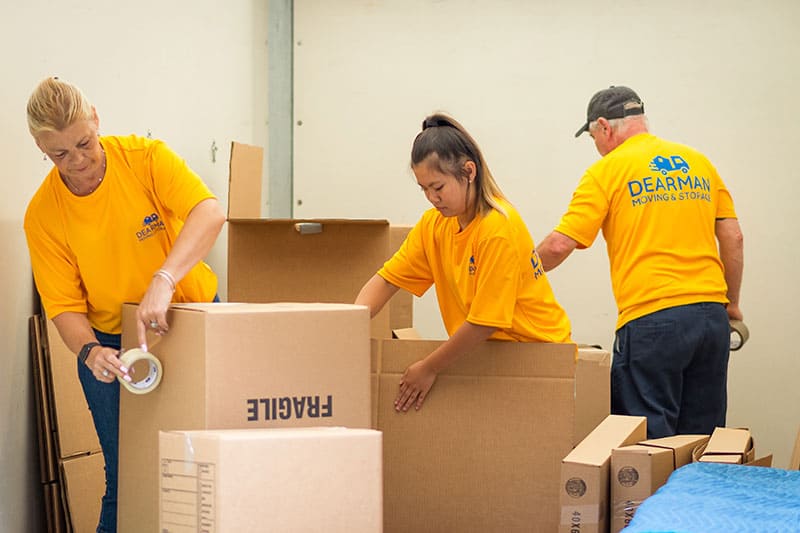Why freight experts matter in shipping overseas
Understanding the Inclusions of moving and Freight Forwarding on the planet of Residential and Global Delivery
Guiding with the complexities of moving and Freight forwarding can be difficult. Both processes involve distinct procedures and requirements that are important for successful transportation. Recognizing the distinctions in logistics, documentation, and risk administration is vital for individuals and businesses alike. This knowledge can considerably influence the efficiency and security of shipments. However, numerous are not aware of the certain elements that influence the total experience and end results. What elements should one think about to assure a smooth transition?
The Essentials of moving and Freight Forwarding
moving and Freight forwarding are essential components of the global logistics sector. They facilitate the transfer of items and individual belongings across domestic and global boundaries. moving mainly involves the moving of individuals or family members, incorporating business and domestic demands. It typically consists of packing, filling, moving, and unloading things at the destination. In contrast, Freight forwarding is concentrated on the delivery of products, usually wholesale, making use of various transportation modes, such as land.freight, air, or sea forwarders work as intermediaries, coordinating logistics to assure timely delivery while navigating with complicated regulations and custom-mades treatments. Both procedures call for mindful preparation, organization, and interaction to assure performance and decrease disturbances. Comprehending these principles is vital for anyone involved in logistics, as they lay the groundwork for advanced elements of shipping and transportation administration.
Secret Elements of Freight Forwarding Providers
Freight forwarding solutions incorporate numerous important parts that assure smooth transport of goods. Key responsibilities of Freight forwarders include handling logistics, working with deliveries, and dealing with custom-mades clearance. Additionally, comprehending essential delivery documentation is crucial for conformity and reliable motion of cargo.
Freight Forwarder Responsibilities
A reputable Freight forwarder plays a necessary duty in working with the transportation of products, ensuring that deliveries are handled effectively and in conformity with policies. Their obligations encompass numerous essential jobs, consisting of selecting perfect transport paths, working out Freight prices, and taking care of logistics. They function as intermediaries in between carriers and providers, making certain that cargo is correctly packaged and classified for safe transportation. Additionally, Freight forwarders track deliveries, providing updates to customers about the status and anticipated delivery times. They likewise assess and handle threats related to transport, recommending insurance policy options as required. By facilitating communication and documents, Freight forwarders improve the delivery process, minimizing potential delays and boosting overall supply chain performance.
Shipping Documents Basics

Comprehending Customizeds Clearance and Paperwork
Exact documentation is important in the customizeds clearance process, as it ensures conformity with numerous laws. An overview of customizeds policies highlights the intricacies dealt with by carriers and Freight forwarders. Typical clearance challenges can significantly impact delivery timelines and prices, making understanding this aspect necessary for reliable logistics.
Relevance of Accurate Paperwork
Steering with the complexities of global shipping needs an eager understanding of customizeds clearance and the critical function of documents. Accurate paperwork is essential for making sure that deliveries adhere to laws and reach their destinations right away. Effectively prepared files, consisting of bills of lading, industrial billings, and packing listings, help with smooth communications with custom-mades authorities. Inaccuracies can result in shipment hold-ups, fines, or also confiscation of products. Thorough paperwork help in tracking shipments and resolving disputes. Organizations involved in moving and Freight forwarding have to prioritize careful paperwork techniques to browse the intricate landscape of global delivery successfully. This diligence not only improves operations however likewise improves customer fulfillment by ensuring prompt delivery.
Customs Rules Introduction
Steering custom-mades policies is a vital aspect of international profession that straight influences the success of moving and Freight forwarding procedures. Effective customs clearance calls for an understanding of numerous policies, including tolls, duties, and import/export constraints. Precise documentation is important, as it guarantees conformity with legal needs and assists in the effective activity of products across boundaries. Secret records commonly include business invoices, packaging listings, and bills of lading, which supply comprehensive information regarding the shipment. Furthermore, customs brokers play a crucial duty in steering intricate regulations, working as intermediaries in between shippers and custom-mades authorities. By maintaining complete understanding of customs procedures, companies can substantially minimize hold-ups and lessen expenses associated with global delivery.
Usual Clearance Obstacles
Numerous difficulties can develop during the custom-mades clearance process, usually complicating the activity of goods throughout boundaries. One significant issue is inadequate paperwork, which can bring about charges and hold-ups. Exporters and importers should ensure all called for documentation, such as invoices, packing lists, and certificates of origin, is precise and full. Additionally, inconsistencies in valuation can set off examination from custom-mades authorities, leading to extra obligations or evaluations. Language barriers may likewise position difficulties, as miscommunication can result in misconceptions regarding guidelines. Modifications in custom-mades policies can produce confusion, demanding consistent watchfulness by shippers. Ultimately, overcoming these clearance tests calls for thorough prep work and a clear understanding of customizeds requirements to facilitate smooth global deals.
Packaging and Labeling Needs
Although typically ignored, packaging and labeling needs play a crucial duty in Going Here the shipping procedure, ensuring that items are secured and quickly recognizable throughout their trip. Correct packaging safeguards products from damages during transportation, while also assisting in efficient handling and storage space. Making use of suitable products, such as bubble cover, foam, or durable boxes, can protect against breakage and loss.Labeling is just as critical. Accurate and clear labels share crucial info, consisting of the location, dealing with guidelines, and contents. Labels need to abide by policies specific to international and domestic shipping, which may consist of unsafe materials identification or custom-mades declarations.Moreover, standard labeling techniques simplify the tracking process and improve general logistics performance. By sticking to packaging and labeling requirements, businesses reduce the danger of hold-ups, damages, or misdelivery. Inevitably, these techniques contribute substantially to the success of moving and Freight forwarding procedures, making certain a smooth delivery experience for all events involved
Tracking Shipments: Importance and Methods
Efficient packaging and labeling set the foundation for successful shipment monitoring, yet tracking deliveries is just as essential in the shipping procedure. Delivery tracking offers real-time exposure, which helps consumers and businesses monitor the progress of their goods. This openness boosts client satisfaction, since customers can remain educated regarding shipment timelines and any possible delays.Several approaches help with effective monitoring. Barcode scanning is an usual method, utilizing unique identifiers to check packages throughout their trip. Furthermore, GPS technology makes it possible for specific place tracking, permitting prompt updates and enhanced logistics management. Many delivery companies currently provide digital systems and mobile applications that offer customers with simple access to tracking information.The importance of shipment monitoring can not be overemphasized; it lessens the danger of shed or damaged items, improves operational effectiveness, and fosters trust fund in between recipients and carriers. Incorporating efficient monitoring methods is crucial for successful domestic and international delivery procedures.
Insurance Options for Your Product

Protecting insurance policy for items en route is a vital consideration for individuals and companies alike. Insurance coverage options vary based upon the kind of delivery, value of goods, and specific dangers entailed. Usual types include provider obligation, which covers loss or damage while in transportation, and full-value insurance, offering substantial insurance coverage for the total value of the goods.Shippers may additionally consider marine insurance coverage for worldwide deliveries, securing versus risks related to sea transportation. It is important to assess the particular needs of the shipment and assess the terms of any policy.Furthermore, understanding exclusions and limitations is crucial to avoid prospective voids in protection. Carriers ought to engage with insurance professionals to check out customized options that fit their special circumstances. Ultimately, purchasing the right insurance coverage can minimize financial threats and provide assurance throughout the shipping process.
Picking the Right moving and Freight Forwarding Solution
When picking a moving and Freight forwarding solution, my latest blog post it is vital for people and organizations to thoroughly examine their certain requirements and priorities. Variables such as the volume of goods, location, and timeline play a considerable duty in this decision-making procedure. Looking into various companies is recommended; contrasting their solutions, prices, and customer evaluations can reveal beneficial insights.Additionally, it is required to take into account the experience and proficiency of the company in handling specific kinds of cargo, especially for worldwide shipments that might involve custom-mades clearance. Openness in prices, consisting of any hidden charges, ought to likewise be scrutinized.Furthermore, reviewing the degree of client support used is necessary, as prompt communication can minimize problems throughout transit (freight shipping). Confirming the accessibility of insurance policy alternatives assures that products are protected throughout the shipping procedure. By taking these organizations, actions and individuals can make informed choices that align with their logistics requirements
Regularly Asked Inquiries
What Kinds Of Product Can Be Shipped Worldwide?

Exactly How Do Shipping Prices Differ In Between Various Carriers?
Delivering prices differ substantially in between service providers due to variables such as solution rate, cargo kind, range, and added services used. Each service provider's pricing version reflects these variables, affecting general delivery expenses for clients.
Can I Ship Hazardous Products or Perishables?
Shipping go harmful materials and perishables is subject to rigorous regulations. Carriers frequently need specific product packaging, labeling, and documentation. Carriers must guarantee conformity with international and neighborhood regulations to stay clear of penalties and guarantee risk-free transport.
What Should I Do if My Delivery Is Delayed?
When faced with a shipment delay, one need to initially contact the copyright for updates. After that, examine any kind of notices received, evaluate alternate services, and keep all events notified concerning the situation to lessen disruptions.
Exist Weight Boundary for Delivery Containers?
Weight limits for delivery containers vary relying on factors like container size and shipping policies. Normally, basic containers have an optimum gross weight of around 30,000 to 32,000 kgs to guarantee risk-free transport and handling. In comparison, Freight forwarding is concentrated on the delivery of goods, usually in mass, making use of different transport settings, such as land.freight, sea, or air forwarders act as middlemans, coordinating logistics to assure timely delivery while maneuvering with complicated laws and personalizeds procedures. Trick responsibilities of Freight forwarders include managing logistics, collaborating deliveries, and taking care of customizeds clearance. A trustworthy Freight forwarder plays an essential role in working with the transportation of items, guaranteeing that deliveries are managed effectively and in compliance with regulations. Effective product packaging and labeling set the foundation for effective shipment monitoring, however tracking shipments is just as necessary in the shipping process. Many delivery firms currently supply electronic systems and mobile applications that supply users with simple accessibility to tracking information.The relevance of delivery tracking can not be overemphasized; it decreases the threat of lost or harmed products, enhances operational effectiveness, and cultivates count on between recipients and carriers.